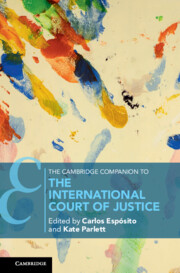Book contents
- The Cambridge Companion to the International Court of Justice
- Cambridge Companions to Law
- The Cambridge Companion to The International Court of Justice
- Copyright page
- Contents
- Contributors
- Preface
- Introduction
- Part I The Role of the ICJ
- 1 Functions of the International Court of Justice
- 2 The Role of an ICJ Judge
- 3 The Role of the International Court of Justice in the Development of International Law
- 4 The Institutional Context of the International Court of Justice
- 5 Assessing the Effectiveness of the International Court of Justice
- Part II The ICJ and International Dispute Settlement
- Part III The Impact of the ICJ’s Jurisprudence
- Index
- References
4 - The Institutional Context of the International Court of Justice
from Part I - The Role of the ICJ
Published online by Cambridge University Press: 18 May 2023
- The Cambridge Companion to the International Court of Justice
- Cambridge Companions to Law
- The Cambridge Companion to The International Court of Justice
- Copyright page
- Contents
- Contributors
- Preface
- Introduction
- Part I The Role of the ICJ
- 1 Functions of the International Court of Justice
- 2 The Role of an ICJ Judge
- 3 The Role of the International Court of Justice in the Development of International Law
- 4 The Institutional Context of the International Court of Justice
- 5 Assessing the Effectiveness of the International Court of Justice
- Part II The ICJ and International Dispute Settlement
- Part III The Impact of the ICJ’s Jurisprudence
- Index
- References
Summary
This chapter examines the institutional context of the Court. It focuses first on the Court’s function as a court, i.e. as the principal judicial organ of the United Nations. It then considers the Court’s relations with States, as an international court. Finally, he considers the Court’s institutional grounding as an organ of the United Nations, and examines its relationship with the United Nations. Professor Ginsburg argues that there is a gap between the Court’s formal institutional structures and its actual operation in practice, and emphasises in particular the way in which the Court has taken a central role in the development of international law.
Keywords
- Type
- Chapter
- Information
- Publisher: Cambridge University PressPrint publication year: 2023
References
Further Reading
- 1
- Cited by

